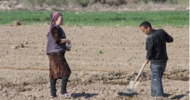The company plans to lease land to grow palm oil, sugar cane and cereals in Tanzania, to add to land it has acquired in Ethiopia. Karuturi is visiting Tanzania, Uganda and Ethiopia as part of a delegation of 35 Indian investors.
The government has not presented satisfactory and truthful explanations about its actions, let alone credible defense of its role as agency and facilitator of the abominable practices of farmland grabbing.
- tramnsformingethiopia
-
11 August 2011
The thriving market for land for commercial agriculture in East and West Africa is now seen as a threat to food security as rural populations are pushed off prime land.
- East African
-
07 August 2011
Saudi Star Agricultural Development is being sued by an Ethiopian state company for failure to pay for the clearing of land in the Gambella Regional State.
- Addis Fortune
-
07 August 2011
Failing rains and drought are not the primary causes of the chronic food shortage and persistent famine hitting Ethiopia given the immense potential the country has.
Karuturi Global is hiring Punjabi farmers to leave India and farm its large holdings in Ethiopia
- Business Standard
-
01 August 2011
Government spokesman Simon Bereket calls the group’s accusations “baseless.”
Germany's Africa policy coordinator on Thursday blamed China's practice of buying up land in the Horn of Africa for contributing to the devastating famine ravaging the region.
The US-based Worldwatch Institute recommends three considerations to help guide global land transactions to promote mutual benefit.
- Worldwatch Institute
-
26 July 2011
A Survival investigation has uncovered alarming evidence that some of Ethiopia’s most productive farmland is being stolen from local tribes and leased to foreign companies to grow and export food – while thousands of its citizens starve during the devastating drought.
While millions of people in the Horn of Africa suffer a terrible drought, foreign investors are harvesting tonnes of cereals to be exported to Asia and the Gulf states.
- Infosud/swissinfo.ch
-
21 July 2011
The Chaco – which stretches across Argentina and Paraguay – is now being ripped up and converted to US-style ranchland by bulldozers even faster than it was before and the few Indians who live there have never felt more threatened, writes John Vidal
- The Guardian
-
08 July 2011
Pambazuka News spoke to Anuradha Mittal, Jeff Furman and Frederic Mousseau about what prompted their research on large-scale investments in land in Africa and what they discovered.
Les fonds de pension sont peut-être l’une des rares catégories d’accapareurs de terres auxquelles les gens peuvent couper l’herbe sous le pied, pour la bonne et simple raison que c’est de leur argent qu’il s’agit.
Los fondos de pensiones pueden ser uno de los pocos tipos de acaparadores de tierras que los trabajadores pueden desbaratar, por el sólo hecho que ellos son los dueños del dinero
Japanese translation of article of GRAIN, "Pension funds: key players in the global farmland grab"
Pension funds may be one of the few classes of land grabbers that people can pull the plug on, by sheer virtue of the fact that it is their money.
"In a world where war is provoked by food scarcity, farmers are the peacekeepers. No surprise, then, so many regimes want more of them," writes a journalist visiting the South African farmers taking up farming in Georgia.
- Mail & Guardian
-
24 June 2011
UAE-based food company IFFCO Group will be investing in palm oil plantations and cattle processing facility in Ethiopia — a country that could be one answer to UAE's food security issues, said a senior company official.
As the G20’s agriculture ministers arrived in Paris for a two-day meeting, more than 500 non-governmental organisations from around the world have delivered a petition calling for a halt to land grabbing under the guise of “responsible agricultural investment”.
Cientos de organizaciones de la sociedad civil, incluyendo movimientos de agricultores y ganaderos, grupos de mujeres y organizaciones no gubernamentales, harán un llamamiento internacional contra el acaparamiento de tierras en el marco de la reunión sobre agricultura del G20, celebrada en París el 22 y 23 de junio.
Des centaines d'organisations de la société civile notamment des mouvements paysans, des groupes de femmes et des organisations non-gouvernementales, lanceront un appel mondial contre l'accaparement des terres agricoles lors de la rencontre du G20 sur l'agriculture qui se tiendra à Paris les 22 et 23 juin.
Hundreds of civil society organisations including farmers' movements, women's groups and non-governmental organisations, will launch a global appeal against farmland grabbing during the G20 meeting on Agriculture in Paris on June 22 and 23.
The Philippines is among the leading target countries for land deals despite provisions in the Constitution barring foreigners from owning land.
Letter asks Indias to join with Ethiopians and other Africans in confronting the hundreds of Indian companies who are now at the forefront of colluding with African dictators in robbing the people of their land, resources, lives and future
Saudi Arabia’s Minister of Agriculture calls Kazakhstan, Russia and Ukraine “probable countries of investment” in farmland and confirms Kingdom's continued interest in farmland in south Sudan.
Farmland has been placed into the spotlight by "guru investors," wealth management funds, growing mega agri-industries, wealthy individuals, and food insecure nations.
- Business Insider
-
15 June 2011
Iowa agribusiness investor Bruce Rastetter is leading a project to turn as much as 800,000 acres [324,000 hectares] of land in the east African country of Tanzania into a massive grain-and-livestock operation.
- Des Moines Register
-
14 June 2011
It is true that many of the land deals are not structured to benefit local communities but it is wrong to claim that such investments will only help promote food exports at the expense of local needs, says Calestous Juma.
- Daily Nation
-
14 June 2011
A new report published this week claims farmers in Africa are being driven off their traditional lands to make way for vast new industrial farming projects backed by European hedge funds seeking profits and foreign countries looking for cheap food.
















